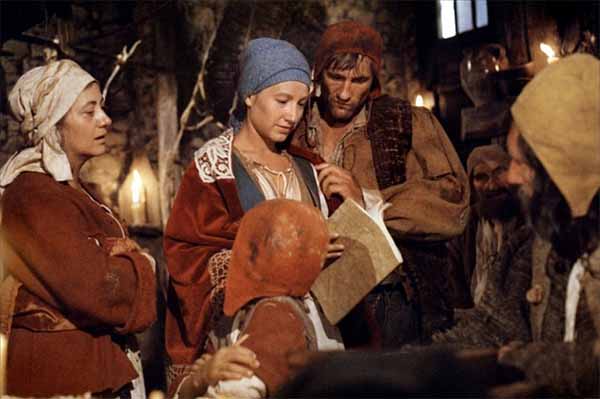Martin Guerre : An Impostor ?

The man who passes himself off as Martin Guerre, husband of Bertrande de Rols, is he an impostor? For several months, nearly one hundred and thirty witnesses marched before the court of Rieux, near Toulouse, where he was tried.
For some, identity theft is obvious: the defendant is bigger, less skilful than the real Martin Guerre and, according to the shoemaker, his shoe size smaller. Moreover, a soldier from Rochefort claims that Martin Guerre, wounded in the war, has a wooden leg: the accused would be a bad boy, named Arnaud du Tilh, known as "Pansette". For the others, and especially for his sisters, this is the real Martin: same warts on his right hand, same scar on his forehead, same teeth, same face. Moreover, how could a man manage to deceive for years his wife, with a virtuous and honest reputation? The judges are confused.
The affair began three years earlier when a man, claiming to be Martin Guerre, returned after an eight-year absence to the village of Artigat and resumed living together with his wife Bertrande. She has a little trouble recognizing him, but time has passed and this returning husband is considerate, active, and a good merchant. Uncle, Pierre Guerre, and the neighbors are also surprised, but they are quickly reassured by all the details Martin provides about his past. The couple lead a peaceful life, "like real marriages, eaters, drinkers and couchans usually together". The eldest son, Sanxi, conceived before Martin left, is growing up. Two little sisters arrive at the home. All would be well if Martin did not have the idea to hold Pierre Guerre to account for his management and to sue him. Pierre notices that Sanxi does not look like the new Martin at all and that he no longer practices his childhood passion, fencing.
Family doubts
Suspicions arise. The family is divided, but Bertrande fiercely defends her husband. If Martin Guerre is not Martin Guerre, why is Bertrande supporting him? The young woman was not happy early in her life. Married at a very young age, she had to wait years for the marriage to "consummate". Then, after Sanxi’s birth, due to a dispute with his father, Martin left the village and was never seen again. Bertrande returned to live with her parents. So when this husband falls to her from the sky, she expresses her joy and silences her doubts. It was then that Pierre Guerre, upset by the attacks of his "nephew", called for an investigation. He goes to find the judge of Rieux and claims to be mandated by his niece. Bertrande, pressed by her family, is forced to join in the complaint.
The testimony of a man who formally recognizes Martin for Arnaud du Tilh overwhelms the accused, and he is thrown in prison without delay, as is the case when there is suspicion of "several great and enormous delicts" . the trial begins. According to the Villiers-Cotterêts ordinance of 1539, which regulates acts of justice, the "criminal" is not entitled to the assistance of a lawyer, and Martin assures his defense alone. Despite great firmness and presence of mind, he was found guilty of sham and sentenced to death.
Spectacular turn of events
He appealed to the Parliament of Toulouse, where the criminal chamber examined the case in April 1560. The lawyer Jean de Coras was appointed as rapporteur. In front of the mass of testimonies, he asks for a few weeks of delay and he questions the witnesses separately. Jean de Coras weighs the arguments: Pierre Guerre, who wrongly said he was mandated by Bertrande, was he not acting out of revenge? Coras also measures the uncertainty of memories, the precariousness of evidence. Bertrande's morality and her conjugal love make a good impression on her. The accused, confronted with the witnesses, answers the questions with precision. Wise, tidy, it does not look at all like the portrait of "Pansette". Finally, Coras judges the opinions "more disposed to the advantage of the prisoner against the said Pierre Guerre and Rols". It was then that, at the end of July, a man hobbled to put himself at the disposal of parliament: he has a wooden leg and declares himself the real Martin Guerre, returned from Spain. The trial has caused quite a stir and he wants to confuse the impostor.
At the sight of her, Bertrande bursts into tears and begs her forgiveness, but the husband, absent for twelve years, is uncompromising! As for the false Martin, he is obliged to confess: one day, passing through a village, two men greeted him by mistaking him for Martin Guerre. Gathering then all kinds of information, he had the idea to take the place of the absent one… On September 12, the parliament opened its doors to the public so that they could hear the sentence: accused of adultery and capturing of inheritance, convinced of bawl and forfeiture, Arnaud du Tilh is condemned to be hanged and burned. The gallows was erected in Artigat, opposite the house of Martin Guerre, four days after the judgment, on September 16. The convict must make "amends" before the execution. He is led, like the penitents, barefoot, in a shirt, a torch in his hand, the noose around his neck, through the streets of the village and he asks forgiveness from God, the king, the court, Martin Guerre, Bertrande. de Rols and Pierre Guerre. As he climbed the ladder, Arnaud du Tilh begged the real husband not to harass his wife, a woman of honor and virtue who courageously left him as soon as she had any suspicions.









































































































































































































































































































































